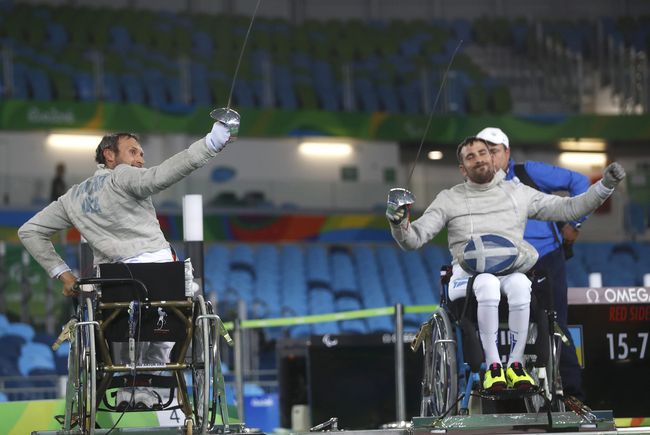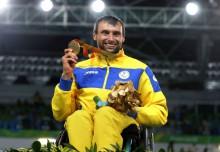“Ukraine’s Anton Datsko wins 15th Paralympics gold in men’s wheelchair saber category B event,” “Lviv region athlete wins 20th gold medal in Rio,” “Fencer Datsko wins national team’s ‘jubilee gold.’” Most of this country’s internet resources abounded in this kind of headlines on September 12. The Paralympic Games in Rio de Janeiro are in full swing. The national team of Ukraine has already shown itself as a professional closely-knit unit that is certain to fight for a top place in the medal count. However, very few, if any, know the personal stories of athletes’ successes.
Then, in the final, the 33-year-old saber fencer from Busk, Lviv oblast, defeated the Greek Panagiotis Triantafyllou with a staggering score of 15 to 7. Shortly before, our athlete had beaten Adrian Castro (Poland), who eventually won the bronze medal, Marc-Andre Cratere (France), Joey Brinson (US), and Alessio Sarri (Italy).
To sum it up, our nation team took a record-breaking third place in the overall medal tally, winning 41, 37 silver, and 39 bronze medals. Each medal is the result of a personality’s efforts. Each individual has a big history of sporting success. Athletes themselves are telling thousands of little stories, when a disabled person finds it more difficult to get to the training gymnasium than to win at a competition.
Shortly before our team flew home from Rio, The Day phoned Aton Datsko to congratulate him and let him tell our readers the story of his success.

REUTERS photo
Anton took up fencing after an accident, when he, a senior school pupil, climbed up a walnut tree. He did not notice a live electric wire between the boughs. “I can’t remember what was next, but I came to on the ground with a spine fracture. I couldn’t feel the legs,” the athlete says. “The surgery was successful. Doctors were assuring me that ‘it was not the end,’ that life does not end after a fall like this, that I could still study and even go in for sport. The injury was very serious. Naturally, receiving an injury at 16, I did not at first even think of doing sport. But when I had a regular rehab in Lviv, I was advised to begin to go in for sport. I was told it was the best rehabilitation and a chance to find a stimulus in life, realize myself as an individual, and improve my health. I understood that it was too early to despair – I can and must go on living. I decided on further reflection to do something professionally, to make this ‘something’ my hobby, stimulus to life, work.”
Why did you decide to take up nothing but fencing?
“I sought an opportunity to go in for sport regularly and professionally. Then my first coach Andrii Kolesnykov suggested wheelchair fencing. I accepted it. Step by step, training by training… There is a really good program, Invasport, in Ukraine, which let me train in Lviv. Naturally, there were difficulties with transportation to the place of training and discomforts in everyday life. But, in spite of all obstacles, people with disabilities in our country have a chance to realize themselves in sport. When I had already forced my way to the national team and begun to show results, the state granted me a stipend and a pension. And Invasport supported us at each stage of our professional growth. Let me say it frankly: we owe all our successes to this program and Valerii Sushkevych [chairman of the Paralympic Committee of Ukraine. – Author] who keeps everything under control. Look, I am well known now because I’m a champion. But even when I was only a beginner and hadn’t yet won any serious victories, he knew who I was and what sport I was practicing. He would ask me how he could support me. He is an incredible person!”
You are a professional athlete today. Is this your job and the main source of income?
“Yes, of course. When I was only beginning to go in for sport, I temporarily worked at a garment factory. I am a tailor by profession. It became clear after the first successes that I should spend more time at training sessions. Then I focused on sport. Naturally, the state pays me at least some sort of pension and provides certain living conditions. But I wanted to achieve more. Today, it is my only source of income. Whether or not you are disabled, you must fully devote yourself to the cause of your lifetime. Otherwise there will be no results.”
The whole country exulted over your victory. And what did you feel at the moment of being decorated?
“I am short of words. My impressions are really breathtaking. When I was saber-fencing, I was excited very much. I persistently struggled, or even fought, for this victory. When I won the first bout, this added to my optimism and self-confidence. Then I won the second and the third bouts… And now the final! A maximum concentration of willpower – and you are being decorated now. You know, I won in the final with a very large score – 15 to 7. Many congratulated and supported me sincerely, but some others were saying: ‘He got gold too easily, there was no adequate competition.’ Of course, this hurt me. In our sport, everything depends on concentration.
“I’ve been in wheelchair fencing since 2003. I contested the first place at the London Games [Datsko won silver at the Summer Paralympics 2012. – Author] but failed. I gained the medal for my country in Rio – it is the result of a ‘long victory’ and exhausting trainings.”
Anton, the attention of the whole country is riveted to the national team today. Well done, you are our pride! Do you think that the moment when medals are still “hot” and you are being heard is the right time to address in a loud voice the problems of the disabled people whose number in Ukraine is, unfortunately, still large?
“Undoubtedly. Athletes apart, disabled people in this country have very few opportunities to realize themselves, to say nothing about comfortable living conditions. There are lots of problems. And it is not only the question of personal realization and adaptation. It is a question of elementary conveniences of life. Wheelchair-bound people like me feel unbelievable discomfort when they just move across the city. You can’t fancy that. Every time you need to go outside is an ordeal. There are practically no ramps. Every staircase is an ordeal. There are catastrophically few public transportation means equipped with ramps for people in wheelchairs.
“You know, we were told before the Games that Brazil is a very poor country with rampant crime, etc. But what did I see? All of the public transport, all the bus stops, and all the road crossings are adjusted for people in wheelchairs. No problems at all. And in our country, the most cynical thing is that the newly-built apartment houses or offices do have ramps or elevators for the wheelchair-bound people, but they are absolutely unsuitable and unadjusted – just to be with it. I’ve only said a few words about people in wheelchairs. But it will take more than a day to discuss the problems of other people with disabilities. Yet it would be also wrong to say that nothing at all is being done. People receive allowances. There are volunteer organizations. And the most striking example of help is the abovementioned program Invasport which has given another chance to thousands of people.”







